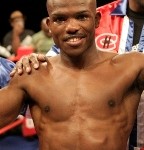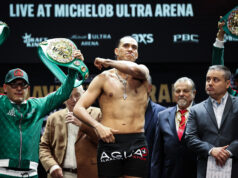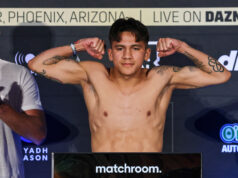
Saturday Timothy Bradley, inactive since decisioning Manny Pacquiao nine months ago, will return from exile to defend against Russia’s Ruslan Provodnikov the burnt-maroon WBO welterweight belt Bradley took from Pacquiao in June. Provodnikov, with three more knockouts in his 23 prizefights than Bradley has in 29, might well be the wrong style for Bradley, slugger to volume puncher, but wrong styles is where Bradley has found himself since inciting the wrath of a public still naïve enough in 2012 to believe Pacquiao, if he could just keep getting decisions, might meet Floyd Mayweather in the Fight to Save Boxing.
Bradley has appeared on a conference call and a television show recently, as part of his promotional duties, and done a fairly good imitation of the late Joe Frazier declaring forgiveness for Muhammad Ali – which is to say Bradley is unconvincing when he says he is done thinking about what happened to him, and his career, and his family, after he decisioned Pacquiao. He isn’t, and he should not be.
What will they say about what we said about Timothy Bradley? That’s a question to ask ourselves the next time television convinces us to pile on the performance of an athlete like Bradley, the next time we are drafted like pawns in a network’s or promoter’s army of self-interest and profitability, the next time we are convinced something like our proper identities is staked on how well we proclaim the favored man in a superfight was wronged by public servants with nothing to gain by his wronging.
“There is a difference when you view it live and when you view it on TV,” Bradley said on Tuesday’s conference call. “Completely different.”
Completely right. One needn’t bore into the untrustworthy properties of projected images – though one is welcome to, if it will help – to understand how very different, how very unreal, the experience of watching a fight on television is, with its jiggering cameras, close no far no close no from the back oops he moved to the front no not the ref show the face no back up back up change the angle, and its self-interested commentators and self-referential, and self-reverential, scoring and wildly distorting choice of replays.
Each time television must choose between more realistic and more entertaining, it chooses the latter, yet its celebrants assure themselves it chooses the former – till in a crescendo of absurdity they demand actual participants and actual observers actually present at an actual event, not an image projected through myriad filters, review the filtered projection to find truth. If only Van Eyck and Leonardo could see this spectacle, the way the lenses they used for making glorious illusions have supplanted persons’ faith in eyewitnesses, how heartily they would chuckle.
Some bored postgrad might someday arrange an experiment like this: Project a piece of gray slate on a high-definition television and ask a subject seated in a dark, empty, silent room whether the color is nearer blue or purple, and record his answer. Then set headphones on his ears and ask him again after exposing him to this:
“Big blue everywhere! Blue, blue, blue. Another big blue! This is a historic show of blueness.”
“Now I know a few people out there might be saying ‘purple,’ but I just don’t see it.”
“Reminds me of some of the blues I use. Some of them blue-on-blues, son!”
“I have it scored: blue, blue, blue. Look, it’s a pure blue. Not a sky blue or a robin’s egg blue. It’s as blue as the bluest blue you’ll ever see. Three to nothing – all blue!”
It was the week that followed Bradley’s decisioning Pacquiao in June historians will find offensive. The way the proudest moment of a good man’s career was whitewashed by an entire industry, shouting down dissenters and boarding a promoter’s self-profiting vehicle beneath a streaming banner that read: “No need for a rematch, because we already know who really won!” Bradley is right not to forgive them, he is right to admit his devilish side still finds schadenfreude in Juan Manuel Marquez’s unequivocal leveling of Pacquiao six months later.
Bradley is what they used to call “good people”; he is dignified, serious, friendly and confident. He did not fight his best that night against Pacquiao, and he would win a rematch – which is why none was offered, or will be – because Pacquiao would be watched with different sets of eyes, this time noticing his footwork was sloppy and tangled as he swam over and around Bradley and connected solidly with fewer than one in five punches, a sloppiness made manifest by diminished reflexes, a diminishment that later made openings enough to make Marquez, the master gambler, bet his eternal soul on a right hand no amount of promotional prestidigitation can now undo.
There’s a dramatic documentary here for ESPN to produce in 10 or 15 years, one that will say that although Pacquiao clearly lost the second half of his third fight with Marquez, folks still wanted to believe they saw him do things he simply did not do against Bradley, projecting an image of the man who blitzed Marco Antonio Barrera and Erik Morales onto the one across from Tim Bradley seven months after Marquez asked stylistic questions Pacquiao could no longer answer.
“What they did to my son was wrong,” Ray Bradley, Tim’s father, will intone in a deep, stern voice. “He was undefeated, 28 and 0, and the worst he did was make a close fight with the world’s number one? They had no right.”
Bart Barry can be reached at bart.barrys.email (at) gmail.com











